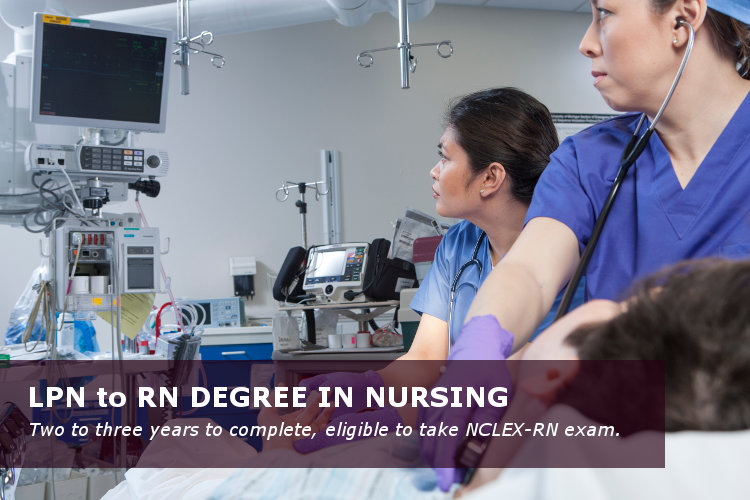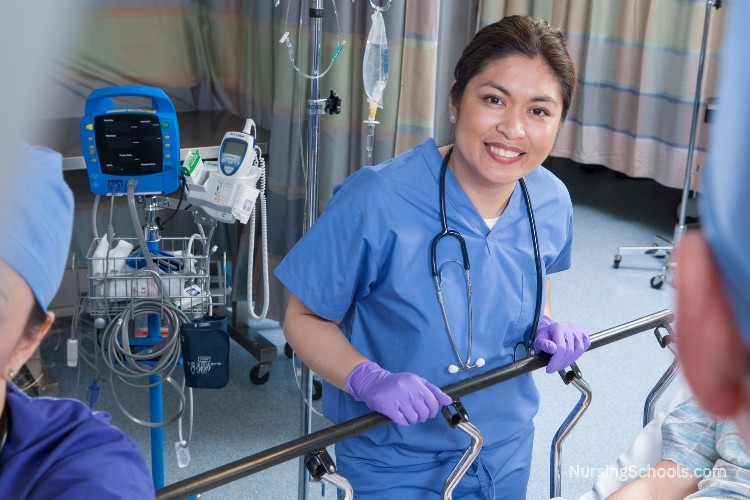LPN to RN Bridge Programs Explained

Overview
What Is an LPN to RN Bridge Program?
An LPN to RN bridge program is an educational pathway designed for the Licensed Practical Nurse (LPN) who wants to become a Registered Nurse (RN). These programs build upon the nurse's existing training and experience, allowing them to complete the coursework required for RN licensure more quickly than a traditional associate or bachelor's degree route.
Most LPN to RN programs culminate in an Associate Degree in Nursing (ADN or ASN), though some bridge directly to a Bachelor of Science in Nursing (BSN). Graduates are eligible to sit for the NCLEX-RN exam, the national licensing exam for Registered Nurses.
Bridge programs are available at community colleges, technical schools, and some universities, and may be offered in full-time, part-time, or hybrid formats to accommodate working nurses.
LPN to RN Program Overview:
- Designed for LPNs seeking RN licensure.
- Most programs award an Associate Degree in Nursing (ADN or ASN).
- Graduates are eligible to take the NCLEX-RN exam.
- Program length ranges from 12 to 24 months.
- Full-time, part-time, and hybrid formats available.
- Curriculum includes nursing theory, lab work, and clinicals.
- Credits may transfer into a future RN to BSN program.
Admissions
What Are the Admission Requirements for an LPN to RN Program?
Admission to an LPN to RN bridge program typically requires a current and unrestricted LPN license, along with proof of graduation from an approved practical nursing program. These programs are designed for Licensed Practical Nurses who want to become Registered Nurses (RN) by earning an Associate's or Bachelor's degree in nursing.
Bridge program requirements vary by school, but most will ask applicants to meet the following:
- Submit a completed application and fee.
- Provide proof of an active, unrestricted LPN license.
- Submit official transcripts from a practical nursing program.
- Meet minimum GPA requirements (often 2.5 or higher).
- Pass a standardized entrance exam (TEAS or HESI).
- Provide a recent physical exam and proof of immunizations.
- Submit to a background check and drug screening.
- Complete CPR certification for healthcare providers.
Some programs may also require work experience as an LPN before admission or give preference to applicants with recent clinical employment. Competitive schools may have waitlists or use a point-based system for admissions.
Curriculum
What Does the LPN to RN Curriculum Include?
LPN to RN bridge programs are designed to expand the clinical and academic skills of Licensed Practical Nurses and prepare them for RN licensure. Most programs take 1 to 2 years to complete and lead to an Associate of Science in Nursing (ASN) or Associate Degree in Nursing (ADN). The curriculum includes general education, nursing theory, and clinical experiences in medical-surgical, pediatric, and maternal health settings.
The table below shows a typical full-time LPN to RN curriculum organized by academic year:
| Term | Courses | Clinicals |
|---|---|---|
| Year 1 | ||
| 1 |
|
|
| 2 |
|
|
| Year 2 | ||
| 3 |
|
|
| 4 |
|
|
* Source: LPN to RN bridge program curricula from accredited community colleges and nursing schools.

Clinicals
What Are the Clinical Requirements for an LPN to RN Program?
LPN to RN bridge programs include extensive clinical training to help Practical Nurses build the competencies required of a Registered Nurse (RN). These clinicals are completed in hospitals, long-term care facilities, and community health settings, with increasing levels of responsibility each term.
Clinical rotations are structured to match the classroom curriculum and usually begin in the first term with basic assessments and skills check-offs. By the final term, students take part in a capstone clinical and preceptorship experience that mimics the duties of a full-time RN under supervision.
Here are common clinical rotations found in a two-year LPN to RN bridge program:
- Health Assessment. Students learn how to perform complete patient assessments, including vital signs, physical examinations, and documentation.
- Medical-Surgical Nursing. Students gain experience managing acute and chronic conditions in adult patients, administering medications, and performing bedside procedures.
- Long-Term Care Clinical. Emphasizes supportive care, monitoring chronic conditions, and developing individualized care plans for residents in skilled nursing facilities.
- Behavioral Health Clinical. Focuses on therapeutic communication, mental status assessments, crisis intervention, and support for patients with mental illness or substance use disorders.
- OB/Pediatrics Clinical. Combines maternal-newborn and pediatric care, including labor and delivery, postpartum assessments, infant care, and childhood development stages.
- Capstone Clinical Rotation. Provides a final supervised rotation where students demonstrate critical thinking, time management, and independent nursing judgment.
- Preceptorship Experience. Students are paired with an experienced RN and take on a full patient load, simulating the transition from student to licensed nurse.
Most bridge programs include 500 to 700 total clinical hours, which are required for graduation and eligibility to sit for the NCLEX-RN exam. Clinicals must be completed in person under the supervision of approved nursing faculty or preceptors.
Tuition Cost
How Much Does an LPN to RN Program Cost?
LPN to RN bridge programs are typically offered through community colleges, state universities, and technical schools. Because these programs build on previous nursing education, they may require fewer total credits than a traditional Associate Degree in Nursing (ADN), reducing overall tuition costs.
Tuition for these programs varies widely depending on location, program length, and whether the student qualifies for in-state tuition rates. Most public schools charge between $6,000 and $20,000 for the full program, while private institutions may cost significantly more.
Here are sample in-state tuition estimates for LPN to RN programs at community colleges:
- Ohio: $6,500
- Texas: $7,200
- Florida: $8,000
- North Carolina: $9,000
- Michigan: $10,500
- Pennsylvania: $11,000
Additional fees may apply for textbooks, lab supplies, uniforms, immunizations, drug screening, background checks, NCLEX-RN preparation materials, and exam registration. Some schools offer financial aid, scholarships, or employer-sponsored tuition reimbursement for working Practical Nurses.
Outcomes
Where Can I Work After an LPN to RN Program?
Graduates of an LPN to RN bridge program are eligible to take the NCLEX-RN and apply for licensure as Registered Nurses. With this credential, they can work in hospitals, outpatient clinics, long-term care facilities, physician offices, and home health settings. While some employers prefer nurses with a bachelor's degree, many continue to hire associate-prepared RNs, especially in areas facing nursing shortages. With experience, LPN to RN graduates may take on lead responsibilities or move into specialized areas of patient care.
Common job titles for graduates of LPN to RN programs include:
- Ambulatory Care Nurse
- Medical-Surgical Nurse
- Obstetrics Nurse
- Charge Nurse
- Dialysis Nurse
- Preoperative Nurse
- Emergency Room Nurse
- Oncology Nurse
- Pediatric Nurse
- … and many more
Is an LPN to RN program worth it? Yes. This pathway is one of the fastest and most cost-effective ways to become a Registered Nurse. It enables LPNs to enter the RN workforce sooner while leaving the door open for future BSN or MSN study.
Last updated: August 7, 2025
References:
- Licensed Practical Nurses. Bureau of Labor Statistics, U.S. Department of Labor, Occupational Outlook Handbook. Retrieved August 7, 2025.
- Registered Nurses. Bureau of Labor Statistics, U.S. Department of Labor. Occupational Outlook Handbook. Retrieved August 7, 2025.
- Average undergraduate tuition for full-time students. U.S. Department of Education, National Center for Education Statistics. Retrieved August 7, 2025.
- What to Expect During Nursing Clinicals. American Nurses Association (ANA), Nursing Education Guide. Retrieved August 7, 2025.
- NCLEX Exam Information. National Council of State Boards of Nursing (NCSBN). Retrieved August 7, 2025.
- Accelerated Nursing Programs. Education Resources, American Association of Colleges of Nursing. Retrieved August 7, 2025.
- Cost of Attendance. State University System of Florida. Retrieved August 7, 2025.
- LPN to RN Bridge Program. Jersey College School of Nursing. Retrieved August 7, 2025.
- LPN to RN Program, Associate Degree. Pennsylvania College of Technology. Retrieved August 7, 2025.
- From LPN/LVN to RN in 18 Months. Galen College of Nursing. Retrieved August 7, 2025.
- Licensed Practical Nursing (LPN) to Registered Nursing (RN). Reynolds Community College. Retrieved August 7, 2025.
